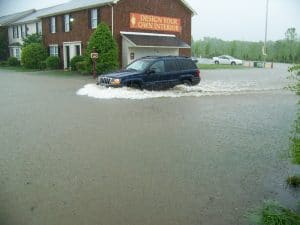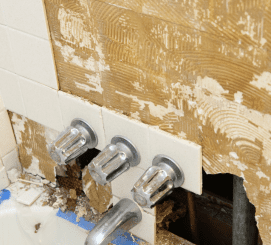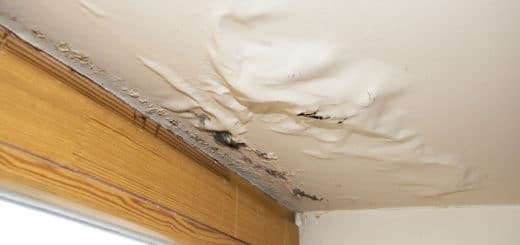How to Stay Safe During a Flood
Every year, more and more lives are taken by flood waters as they are more dangerous than any other weather hazard. The most common deaths related to floodingFlooding is the overflow or accumulation of water in areas t... More occur when a vehicle is driven into hazardous floodwater. But fortunately, there are a number of steps to keep you and your family safe during a flood.
Flood Watch vs. Flood Warning
- Flood/Flash flood watch: a flood/flash flood is possible in your area
- Flood/Flash flood warning: floodingFlooding is the overflow or accumulation of water in areas t... More/flash floodingFlooding is the overflow or accumulation of water in areas t... More is already happening in your area or will happen soon. Don’t hesitate to move to higher ground and follow any evacuation orders.
 Preparing for a Flood
Preparing for a Flood
- Make a plan for your family, including pets, so you know what to do, where to go and what is needed to protect yourselves, both from floodingFlooding is the overflow or accumulation of water in areas t... More and COVID-19.
- Know the level of flood risk in your area by visiting FEMA’s Flood Map Service Area.
- Monitor potential signs of floodingFlooding is the overflow or accumulation of water in areas t... More in your area if it is prone to floodingFlooding is the overflow or accumulation of water in areas t... More, such as heavy rain.
- Practice evacuation routes, shelter plans and flash flood response.
- If you live in a flood zone or mandatory hurricane evacuation zone, only evacuate to shelters if you’re unable to stay with family or friends. Also check when these shelters are open with the local authorities and review your previous evacuation plan to consider other options to maintain social distancing.
- Never forget to include your pets in your emergency plan and to remember that some emergency evacuation shelters do not accept pets.
- Renew or purchase a flood insurance policy because standard homeowner’s insuranceHomeowner’s insurance is a policy that provides financial ... More policies do not cover floodingFlooding is the overflow or accumulation of water in areas t... More. Keep in mind that it takes about 30 days for them to take effect, so you’ll want to invest long before the disaster. Flood insurance plans can be purchased from your insurance agency or the National Flood Insurance Program (NFIP).
- Protect your home and move all valuables to a safe, dry space. Remove all debris from drains and gutters, install check valves and ensure your sump pumpA sump pump is a pump installed in a basement or crawlspace ... More is working.
Flash Flood Watch or Warning: What to Do
- Prepare an emergency food and water supply kit. Always keep at least 1 gallon of water per day for each person and pet. Store at least a 3-day supply.
- Bring in all outdoor items and appliances, including grills, trash cans and lawn furniture, or tie them down tightly.
- For areas that are subject to floodingFlooding is the overflow or accumulation of water in areas t... More, like washes, canyons, and other low spots, leave them right away. Never drive through them if they have standing water.
- Don’t hesitate to evacuate if it is necessary and possible to do so. Don’t forget to turn off the main power switch and close the main gas valve in your home before leaving.
- Have all immunization documents ready and keep them stored safely in a waterproof container.
- Listen to your local television or radio station for news updates.
- If your car is trapped in rapidly moving water, stay inside. But if the water is rising inside the car, get on the roof.
- If you are trapped in a building, go to the highest level, but do not climb into a closed attic as you may become trapped by rising flood water. If necessary, get on the roof and signal for help.
- Stay away from bridges above fast-moving water as the water can quickly wash them away.
- If you are sick and must see a doctor, contact your healthcare provider for additional instructions and shelter in place. But if you have an emergency, call 911 and inform the operator if you have or think you may have COVID-19. If possible, wear a mask before help arrives and if you are staying at a shelter, alert the staff of your condition right away so they can call a local hospital.
 How to Stay Safe After a Flood
How to Stay Safe After a Flood
- Don’t drive unless it’s an emergency.
- Use a generator or other gasoline-powered appliance only outside and away from the windows.
- Stay protected from COVID-19 and other infectious diseases by frequently washing your hands and disinfecting high-touch surfaces with disinfectants.
- Never wade in flood waters, which can be contaminated with debris and dangerous biohazards. Downed power lines can also cause an electric shock.
- Always beware the risk of electrocution. Never touch electrical equipment if it’s wet or you’re in standing water. As long as it is safe to do so, turn off the main power switch to the home.
- Always be available to friends, family, and neighbors as they may need someone to talk about how they feel. As numerous individuals are already stressed from the coronavirus, the threat of a flood can be overwhelming. Never be afraid to reach out to your loved ones if you also need help with coping with anxiety, sadness, or stress.
- Beware of any other dangerous animals in your home like snakes or rodents. When cleaning up, wear heavy work gloves, protective clothing, and boots. It’s also important to wear a mask, especially in the presence of moldMold is a type of fungus that grows in damp or humid conditi... More and other biohazards present in the flood water. People with a weakened immune system or asthma issues should always avoid buildings with water leaks or moldMold is a type of fungus that grows in damp or humid conditi... More growth. Children should also stay away from disaster cleanup work.
Flood Cleanup
Despite the inability to fully prevent floodingFlooding is the overflow or accumulation of water in areas t... More in your home, there are always steps to take to prevent the damage from spreading and restoring the building structureStructure refers to the framework or components of a buildin... More. As long as you are safe, don’t hesitate to reach out to a local flood restoration company to remove any standing water and moisture from your home.
A qualified water damage restoration company will respond right away, extract all flood water from the home, and set up professional dryingDrying is the process of removing moisture from materials, s... More equipment to dry out the building structureStructure refers to the framework or components of a buildin... More. Any soiled porousPorous describes a material that contains small openings or ... More materials like drywall, insulationInsulation is a material used in buildings to reduce the tra... More, carpeting, and other furnishings will be removed. Anti-microbials will also be applied to limit moldMold is a type of fungus that grows in damp or humid conditi... More growth. Hard surfaces can be disinfected and biohazard materialsBiohazard materials are substances that pose a risk to human... More will be removed to prevent the spread of harmful bacteria and pathogensPathogens are microorganisms such as bacteria, viruses, or f... More from the floodwater.
After working efficiently and effectively to restore the building materials and contents within the home, the flood restoration professionals will work with your insurance agency during the claims process. This way you can focus on getting back to your everyday routine and look forward to a fully restored home.












